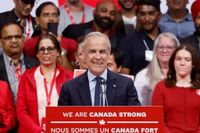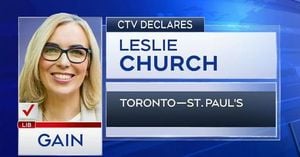In a dramatic turn of events, Mark Carney's Liberal Party emerged victorious in the 2025 Canadian federal election, securing a minority government amidst a backdrop of heightened political tension and economic uncertainty. The election results, announced late on April 29, revealed that the Liberals won 169 seats in the 343-member House of Commons, while the Conservative Party, led by Pierre Poilievre, garnered 144 seats. This victory marks the fourth consecutive term for the Liberals, a remarkable comeback considering they trailed the Conservatives by as much as 25 percentage points earlier this year.
Carney, a former central banker with no prior political experience, led a campaign that resonated with voters seeking stability in the face of global instability, particularly due to threats from U.S. President Donald Trump. His election victory comes after a tumultuous period under former Prime Minister Justin Trudeau, who faced criticism over his handling of various issues including a housing crisis and rising living costs.
As Carney celebrated his win, he emphasized the need for a reshaped relationship with the United States, stating, "Our old relationship with the United States, a relationship based on steadily increasing integration, is over." This statement reflects a growing sentiment among Canadians who feel threatened by Trump's aggressive trade policies and provocative comments about Canada potentially becoming the 51st state.
During his victory speech, Carney called for national unity, urging Canadians to come together regardless of their political affiliations. He articulated a vision for a Canada that prioritizes its sovereignty and economic independence, stating, "My message to every Canadian is this: no matter where you live, no matter what language you speak, no matter how you voted, I will always do my best to represent everyone who calls Canada home." This message resonated with voters who are increasingly frustrated by political divisions.
However, the election results also highlighted significant challenges for Carney. The New Democratic Party (NDP), which had previously supported the Liberal government, suffered a major blow, winning only seven seats and losing its official party status. NDP leader Jagmeet Singh lost his own seat, prompting discussions about the future direction of the party.
In stark contrast, the Conservative Party had initially appeared poised for victory, but Poilievre's alignment with Trump's style and approach ultimately led to a decline in support. Notably, Poilievre lost his long-held seat in Carleton to Liberal newcomer Bruce Fanjoy, who received over 50 percent of the vote. This loss raises questions about the Conservative Party's leadership and future strategy.
Public sentiment leading up to the election was marked by fear and division, with many Canadians hesitant to display political signs in their yards due to the risk of backlash. Reports of vandalism against political signs and aggressive confrontations at rallies have become increasingly common. This environment of hostility has been exacerbated by fear tactics employed during the campaign, with politicians warning of the dangers of Trumpism invading Canada.
Despite these tensions, Carney's victory signifies a potential turning point for the Liberal Party. He has promised to address key issues such as inflation, which has severely impacted family budgets, and the ongoing healthcare crisis, where 6.5 million Canadians lack a family doctor. Carney's administration will need to act swiftly to alleviate these pressing concerns.
Moreover, the economic landscape poses significant challenges. Canada's economy has been grappling with high inflation and a burgeoning housing crisis, with food banks reporting record demand. Carney's plan includes addressing interprovincial trade barriers, which the Canadian Federation of Independent Business estimates cost the economy up to $130 billion annually.
In the wake of the election, Carney has also indicated a desire to strengthen ties with European allies, suggesting a shift towards diversifying Canada's trade relationships. This approach aligns with growing sentiments among Canadians who are advocating for economic nationalism and encouraging domestic purchasing over reliance on American goods.
Looking ahead, Carney's administration will need to navigate a complex political landscape. With a minority government, the Liberals will require support from other parties to pass legislation, and the NDP's significant losses have left them in a precarious position. The Bloc Quebecois, which won 22 seats, has expressed a willingness to collaborate with the Liberals, but the long-term stability of Carney's government remains uncertain.
As Carney prepares for his upcoming meeting with Trump, the stakes are high. He must balance the need for strong trade relations with the U.S. while asserting Canada's sovereignty. The recent election has underscored the importance of addressing both domestic and international challenges, and Carney's leadership will be tested in the months to come.
The 2025 election has not only reshaped Canada's political landscape but also highlighted the deep divisions within the country. As Carney steps into his role as Prime Minister, he faces the daunting task of uniting a fractured nation while tackling pressing economic issues. The coming years will be crucial in determining whether he can fulfill his promises and lead Canada towards a more stable and prosperous future.





